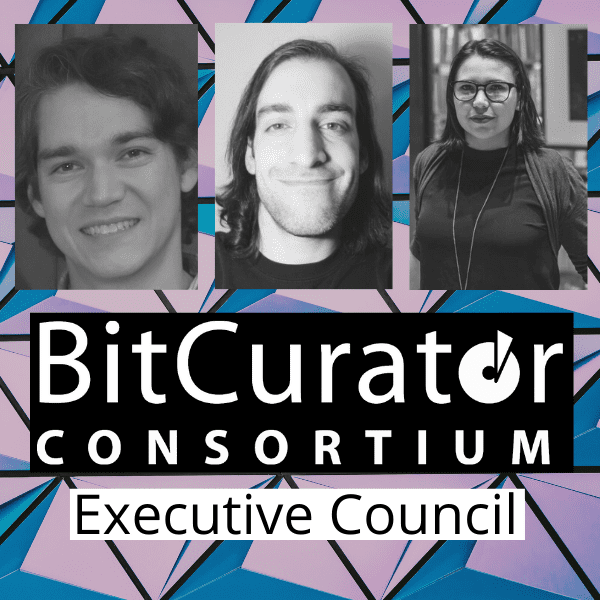BCC Executive Council Elections Candidates 2021
Jess Farrell | BitCurator Consortium
We are thrilled to introduce three BitCurator Consortium Executive Council candidates! In May 2021, the BCC will elect three candidates to serve 2021-2023 terms.
George Apodaca
Bio
George Apodaca is currently the Digital Archivist/Digital Asset Manager at the Archives of American Art — a research unit embedded within the Smithsonian Institution — where he was worked since 2018. In addition to managing the Archives of American Art’s digital assets created by digital formatting from analog, mixed-material collections, he also manages the Archives’ born-digital collections material and develops workflows for the acquisition, ingest, processing, preservation, and meaningful provision of access to said materials. Prior to his time in Washington, D.C., he worked at Harvard University Archives, University of Delaware Library, and at the Special Collections at the University of Arizona. He holds degrees from the University of Arizona (MLIS; BA, Latin American Studies).
Election Statement
I’ve always admired BitCurator’s mission to build a community that supports responsible born-digital practitioners through the use of free and open-source tools. Having experience as an information broker in a variety of settings, I hope to add to this ever-growing knowledge-base that currently exists, and continue to build upon the administrative and cultural partnerships across varying landscapes in furtherance of BCC’s vision.
Joe Carrano
Bio
Joe Carrano is a Digital Archivist in the Department of Distinctive Collections at MIT Libraries where he develops and partakes in workflows to process born-digital material, preserve, and provide access to digital content. He was formerly a National Digital Stewardship Resident at Georgetown University Library. Joe earned an MLS and MA in History from the University of Maryland. He has been involved with the BitCurator Consortium since 2018, serving on the Membership Committee and as a participant in the OSSArcFlow grant project.
Election Statement
I’ve always been impressed with the collaborative spirit of the BCC community and the willingness of its members to help each other with their born-digital work (something that’s benefited me many times). I’m excited for the chance to foster these connections or make it easier for members to find help when they need it whether through tools, documentation, or the community. Having worked on various groups within related communities like Archivematica Users, iPres, NDSA, and DLF BDAWG, I hope to build on these experiences in helping to fulfill BCC’s mission.
Alice Prael
Bio
Alice Prael is the Digital Archivist for Yale Special Collections at the Beinecke Rare Book and Manuscript Library, where she manages a centralized digital accessioning service that provides support for accessioning born digital materials from across the special collection units at Yale University. She previously completed a National Digital Stewardship Residency at the John F. Kennedy Presidential Library where she worked to improve digital preservation practices. She has been active in SAA, serving as a Steering Committee member of the Electronic Records Section, Team Leader of bloggERS, and Chair of the Digital Archives Specialist Subcommittee responsible for managing the DAS certificate program. She has been active in the BitCurator Consortium and has served on the BitCurator Users Forum Program Committee since 2019.
Election Statement
The BitCurator Consortium is an amazing group and I’ve gained so much as a participant in the community. I would love the opportunity to contribute as a member of the BCC Executive Council. I’m particularly interested in strengthening and growing the community and supporting the use of digital forensics. Expanding knowledge of digital forensics beyond technical services staff and creating space for exploration and collaboration is key to growing this community and making our spaces more accessible. I was given the opportunity through a BitCurator Consortium conversation to help draft the Archivist’s Guide to the Kryoflux, a digital forensics tool. This guide provides a more accessible entry-point for archivists and provided me with the chance to collaborate with other digital archivists, explore the tool, and create shared documentation. Projects like this build skills within the community and make digital forensics more accessible to the cultural heritage field. If elected to this role I will help grow the community and advocate for documentation and learning opportunities to make BCC spaces accessible and equitable.
